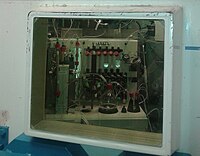
Photo from wikipedia
Automated molecule design by computers has been an essential topic in materials informatics. Still, generating practical structures is not easy because of the difficulty in treating material stability, synthetic difficulty,… Click to show full abstract
Automated molecule design by computers has been an essential topic in materials informatics. Still, generating practical structures is not easy because of the difficulty in treating material stability, synthetic difficulty, mechanical properties, and other miscellaneous parameters, often leading to the generation of junk molecules. We tackle the problem by introducing supervised/unsupervised machine learning and quantum-inspired annealing. Our autonomous molecular design system can help experimental researchers discover practical materials more efficiently. Like the human design process, new molecules are explored based on knowledge of existing compounds. A new solid-state polymer electrolyte for lithium-ion batteries is designed and synthesized, giving a promising room temperature conductivity of 10-5 S/cm with reasonable thermal, chemical, and mechanical properties. This article is protected by copyright. All rights reserved.
Journal Title: Macromolecular rapid communications
Year Published: 2022
Link to full text (if available)
Share on Social Media: Sign Up to like & get
recommendations!